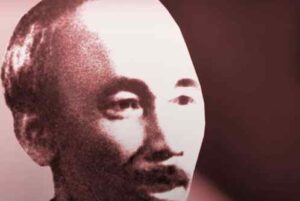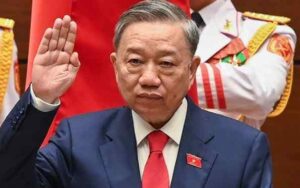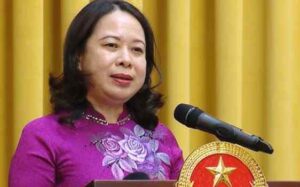Vietnam has had a series of leaders since its establishment as a modern nation. Below is a simplified and unique look at the presidents of Vietnam, presented in a table with their tenures, followed by key details about the first president, the current president, and the current vice president.
READ ALSO: Presidents That Have Ruled Pakistan Till Date
List of Presidents of Vietnam
| No. | Name | Tenure |
|---|---|---|
| 1 | Hồ Chí Minh | 1945 - 1969 |
| 2 | Tôn Đức Thắng | 1969 - 1980 |
| 3 | Nguyễn Hữu Thọ (Acting) | 1980 - 1981 |
| 4 | Trường Chinh | 1981 - 1987 |
| 5 | Võ Chí Công | 1987 - 1992 |
| 6 | Lê Đức Anh | 1992 - 1997 |
| 7 | Trần Đức Lương | 1997 - 2006 |
| 8 | Nguyễn Minh Triết | 2006 - 2011 |
| 9 | Trương Tấn Sang | 2011 - 2016 |
| 10 | Trần Đại Quang | 2016 - 2018 |
| 11 | Đặng Thị Ngọc Thịnh (Acting) | 2018 |
| 12 | Nguyễn Phú Trọng | 2018 - 2021 |
| 13 | Nguyễn Xuân Phúc | 2021 - 2023 |
| 14 | Võ Văn Thưởng | 2023 - 2024 |
| 16 | Tô Lâm | 2024 - Present |
Vietnam’s First President: Hồ Chí Minh

Hồ Chí Minh, also known as “Uncle Hồ,” was the first president of Vietnam and a central figure in its history. He served from 1945 until his passing in 1969.
Key Achievements
- Vietnam’s Independence: Hồ Chí Minh declared Vietnam’s independence from French colonial rule on September 2, 1945, establishing the Democratic Republic of Vietnam.
- Leadership in the War: He led the fight against French forces, which resulted in the significant victory at Điện Biên Phủ in 1954, leading to the Geneva Accords and the eventual division of Vietnam.
- Nation Builder: Hồ Chí Minh worked to unify and develop the nation, focusing on independence and social reforms.
Downsides
- Division of the Country: Despite ending colonial rule, Vietnam was divided into North and South, leading to prolonged conflict.
- Strict Governance: His rule was marked by strict control, with limited tolerance for opposition, resulting in political repression.
READ ALSO: Presidents That Have Ruled China Till Date
Vietnam’s Current President: Tô Lâm

The current President of Vietnam is Tô Lâm, who has held the position since May 22, 2024. Before becoming president, Tô Lâm served as the Minister of Public Security, a role in which he was heavily involved in Vietnam’s anti-corruption campaign. His presidency follows the resignation of Võ Văn Thưởng amid a broad anti-corruption purge within the government.
Key Achievements
- Anti-Corruption Efforts: Tô Lâm played a crucial role in Vietnam’s anti-corruption drive, leading investigations that held high-ranking officials accountable. His work strengthened the government’s efforts to tackle corruption at various levels.
- Security Improvements: As a longtime figure in Vietnam’s security forces, Tô Lâm enhanced the country’s law enforcement capabilities, ensuring stability during periods of change.
Downsides
- Human Rights Issues: His tenure has been criticized for increasing government crackdowns on dissent, with reports of censorship and repression of activists.
- International Controversy: The abduction of a Vietnamese politician from Germany during his time as Minister of Public Security strained Vietnam’s diplomatic relations, drawing international criticism.
READ ALSO: Presidents That Have Ruled Indonesia Till Date
Vietnam’s Current Vice President: Võ Thị Ánh Xuân

Võ Thị Ánh Xuân has served as the Vice President of Vietnam since 2021, with a background in education and various government roles.
Key Achievements
- Education and Social Welfare: She has championed educational reforms and social welfare programs, focusing on poverty reduction and education access in rural areas.
- Gender Equality: As a prominent female leader, she has promoted gender equality and women’s rights in Vietnam.
Challenges
- Limited Influence: The Vice President’s role is largely ceremonial, with limited power to influence significant government policies.
- Human Rights Issues: As part of the government, she has also faced criticism regarding the handling of human rights and freedom of expression.
Conclusion
Vietnam has seen a diverse range of presidents, each contributing to the nation’s progress in their unique ways. From Hồ Chí Minh’s foundational work in establishing the nation to Tô Lâm’s modern leadership, the country’s political landscape continues to evolve. The actions of these leaders have shaped Vietnam’s past and will continue to influence its future.
